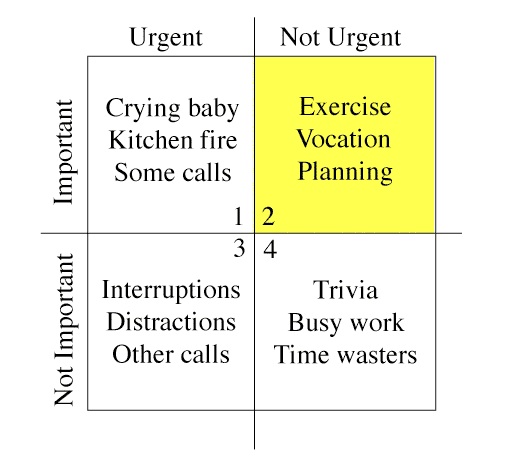
First, a bare-bones time management segment is essential. If the trainees are familiar with Covey’s Urgent/Important 2×2 table (see graphic at below), language can be accommodated. Typically, training developmental activities fall into the “not urgent but important” category. This category includes items that are important but do not necessarily require immediate attention and need to be planned for. This quadrant is highlighted because Covey emphasized this is the quadrant we should focus on for long-term achievement of goals. Some brief attention is needed so T3 trainees shift developmental activities to the “urgent and important” category or expand time for “non-urgent but important” activities. One or both of these are necessary to get beyond current procrastination or temporal barriers that prohibit better quality training. The important thing here is to provide a catalyst to shift from the status quo.

Trainee receptivity certainly will have an impact on actual transfer. Aside from credibility, content for trainer receptivity might provide insights into prospective trainees’ level of motivation and abilities. The trainer’s credibility is influenced by factors such as first impressions, either real or perceived competency, and intentionally developing greater trust among the trainees.
Quality of training is enhanced by knowing objectives and assessing impact. Only trainees can fully determine training quality from a transfer perspective. However, an often-overlooked category for determining quality of training is audience match— making sure there is a match between the training and the ability for the trainees to receive it.
ADVANTAGES OF BOOT CAMP
For those doing T3 training, RCQ boot camp can provide a nice framework into which the trainers can insert developed material or solicit suggestions from the trainees. For those teaching training, it provides a primer that can be used to kick-start training projects. The key here is to transfer a usable framework that trainees can employ in their current training. As such, the closer it is given to actual training projects, the more likely it will be adopted in part or in total. It is not meant to replace more robust T3 designs, but it does provide a memorable structure that is flexible enough to accommodate various levels of experience around a wide range of topics and audiences that can enhance current trainees’ impact.
J.D. Wallace, Ph.D., is the past co-chair of the National Communication Association’s Training and Development Division. He has been active in the governance of the National Communication Association, including roles of senior leadership for both the Training and Development and Human Communication and Technology Divisions. An award winning scholar and teacher with numerous consultations in both for-profit and nonprofit organizations, Dr. Wallace is also a professor of Communication at Abilene Christian University.


